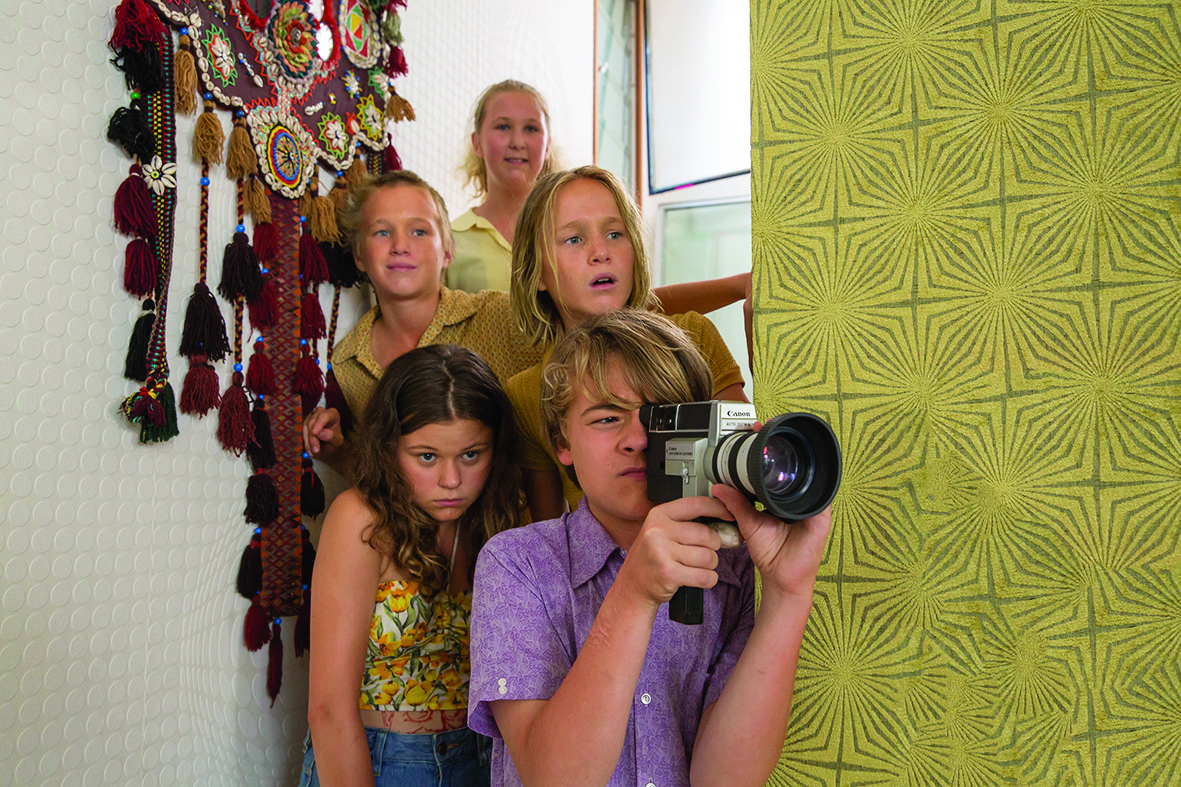You’ve probably been to a dinner party where – after a few too many chardonnays or lagers – the conversation degenerates into an avalanche of ‘remember when’s. Described by The Sopranos’ Tony Soprano (James Gandolfini) as the ‘lowest form of conversation’,[1]In the episode ‘Remember When’ (Season 6, Episode 15). these discussions balance on a knife edge of warm nostalgia and barely concealed bitterness. An anecdote about a family outing turned disastrous is one-half ripper yarn, one-half implicit criticism of your parents’ responsibility (or lack thereof).
Stephan Elliott’s Swinging Safari (2018) is that dinner party writ large as a raucous, often-crude comedy. It’s an ode to 1970s Australiana thickly slathered with signifiers of the era: platform shoes and fondue parties, Mr. Squiggle and Number 96, lava lamps and lamingtons. In many respects, the film is a loving portrait of its era;
Elliott, who came of age during that decade, exhibits an obvious affection for its fashions and foibles. But, much like a drunken dinner-party tale, there’s a bitter aftertaste that’s impossible to ignore.

‘What the hell happened in the seventies?’
Even before you set foot in the theatre, it seems as though Swinging Safari is trying to Say Something About Australia – about how this country came to be the way it is.
That aura of importance is bestowed by the cast and crew. Elliott, of course, is famous for having redefined camp for a new generation of Australians through The Adventures of Priscilla, Queen of the Desert (1994); he reunites here with editor Sue Blainey and costume designer Lizzy Gardiner, both of whom kicked off their careers on a film that’s since established itself as an iconic piece of Australian cinema. Elliott’s populated his cast with icons, too; that sense of cultural import is impossible to ignore when the film is headlined by Guy Pearce and Kylie Minogue as married couple Keith and Kaye Hall. It’s as though Neighbours’ Charlene (played by Minogue), upon zipping off to Queensland in her green Mini, zapped back in time to Wyong Place – a Gold Coast cul-de-sac circa 1975 – and became a garishly dressed, agoraphobic housewife. The remainder of the line-up is stocked with similarly notable Aussie actors: Radha Mitchell (another Neighbours alum) and Julian McMahon as the ‘big kahunas on the block’, Jo and Rick Jones; Rake’s Richard Roxburgh narrating as the adult version of teenage protagonist Jeff Marsh (Atticus Robb); and Gold Logie winner Asher Keddie as Jeff’s mum, Gale. National treasure Jack Thompson has a small role as the local mayor, eager to cash in on tourist dollars when a blue whale washes up on the beach.
Beyond the connotations of significance evoked by the cast, the setting also suggests that Elliott is angling towards a treatise on Australian identity. Queensland in 1975 was defined by flux, politically speaking: a few years after Australia ceased its involvement in the Vietnam War, a few years into a progressive federal government, all while the state government was helmed by a corrupt ultra-conservative by the name of Joh Bjelke-Petersen. Over the film’s opening montage, the adult Jeff asks, ‘What the hell happened in the seventies?’ and we settle in, prepared for a substantive answer.
It swiftly becomes clear that Elliott is more interested in crafting broad jokes than interrogating national identity … While that’s admittedly a letdown, it’s important to note that Swinging Safari is a very funny parody.
Here’s the thing, though: none arrives. At least, nothing more substantial than our narrator’s conclusion that we lived in a country with ‘too much time, too much money and too much cask wine on its hands’. It swiftly becomes clear that Elliott is more interested in crafting broad jokes than interrogating national identity. That’s led some critics to (fairly) conclude that ‘the film fails in its implicit aim to satirise, instead falling back on mere parody’.[2]Travis Johnson, ‘Swinging Safari’, FilmInk, 13 December 2017, <https://www.filmink.com.au/reviews/swinging-safari/>, accessed 2 February 2018. While that’s admittedly a let-down, it’s important to note that Swinging Safari is a very funny parody. In Elliott’s hands, every artefact of 1970s culture becomes an opportunity to get a laugh from his audience. Granted, some of those gags are shallow: super-saturated close-ups of ruffled shirts, pompadour haircuts and grotesque moustaches are hilarious but hardly substantive. Wink-wink-nudge-nudge lines about Betamax video players (sure to sail over the head of anyone under thirty) wouldn’t be out of place in a middling Chuck Lorre sitcom. There are a lot of empty symbols here, ‘remember when’s pitched to a baby boomer audience.[3]It’s worth noting that Jeff, as narrator, lampshades the exaggerated aesthetic, pondering, ‘Am I rewriting history? Probably.’ From the opening frame, the film goes out of its way to underline that its campy style is anything but realistic.
Yet there is a sharper edge to many of the sight gags. A briefly seen headline raves about Karen Carpenter’s ‘New Wonder Diet’. A sticker on Jeff’s older sister Bec’s (Chelsea Glaw) door reads, ‘Gary Glitter: How I Love Women and They Love Me’. These are in the same ballpark as the Betamax gags, in that they’re jokes pitched at a modern audience, but each gestures towards the underlying toxicity – Carpenter’s anorexia nervosa and Glitter’s paedophilia, specifically – of the chintzy culture of the time. Another piece of paraphernalia – a bumper sticker reading ‘Feed Jane Fonda to the Whales’ – speaks more deeply of the popularity of anti-progressive politics in 1970s Queensland than any line of dialogue does.
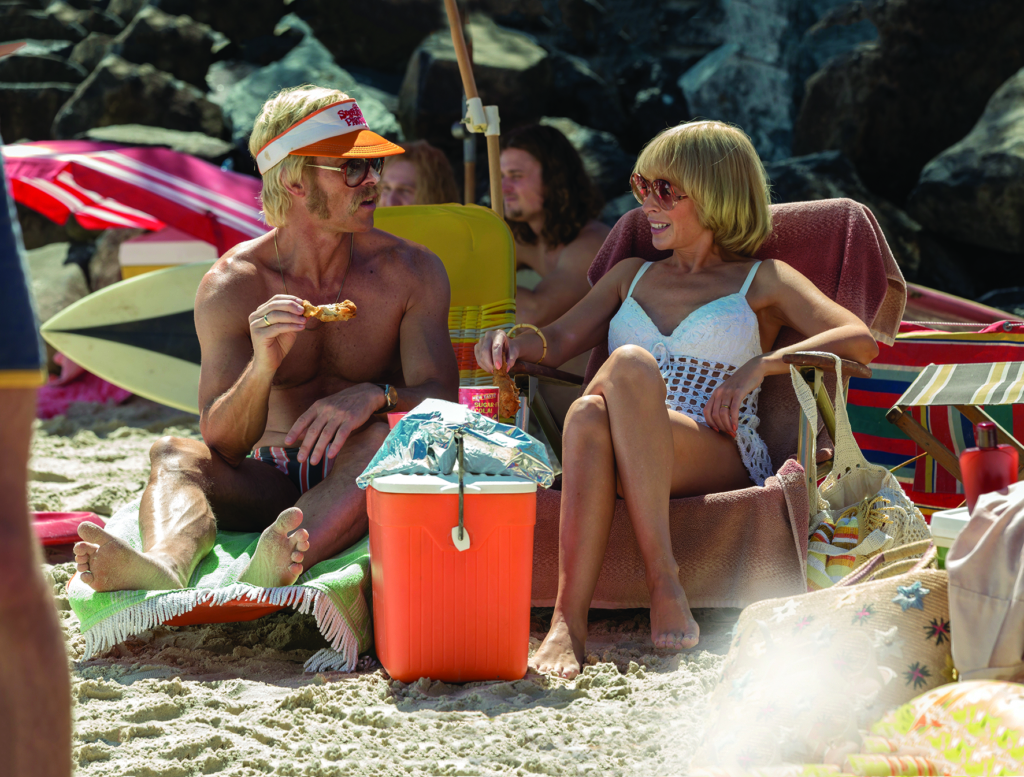
That’s partly by design; Elliott’s screenplay avoids treating his characters as stand-ins for their politics. Or, indeed, a lack thereof. While we see former prime minister Gough Whitlam’s dismissal speech on screen, there’s no indication that these people have any investment or interest in the event. With a touch more finesse, that could’ve made for a truly superlative examination of the era; it’s not hard to imagine the collapse in neighbourhood relations after a disastrous attempt at ‘swinging’ acting as a metaphor for the collapse of Australia’s flirtation with progressive politics. In practice, it’s mostly an excuse for a (very funny) montage of tit-for-tat pranks between the jilted parents.
While the film does operate as a critique of white Australian culture – the absence of notable characters of colour comes across as a conscious choice rather than exclusionary – it’s a shame that it couldn’t have incorporated more insight among the crude comedy. It doesn’t help that some of the subplots come across as misguided or overly mean; a thin storyline about Bec fellating every boy on the block, for instance, smacks of slut-shaming, even misogyny. Swinging Safari’s humour has a sharp edge, but its cuts are too erratic to attain the coherence it promises.
The culmination of both the parents’ aborted attempt at polyamory (which leads to frayed egos and childish pranks) and the whale’s beaching (which leads to gore and destruction) suggests a society whose foray into hedonism ends in disaster.
‘Why would she kill herself?’
Accompanying Swinging Safari’s adults’ oversized antics are two primary subplots: that of the beached blue whale, and that of Jeff and Melly Jones’ (Darcey Wilson) sombre teenage romance. Elliott weaves a symbolic thread between the two storylines; in particular, Melly is drawn to the whale’s suicidal gesture. It clearly resonates with a young girl – ‘the lost girl only I could see,’ as older Jeff describes her – who has anxiety tablets squeezed into her lunchbox alongside sandwiches and Iced VoVos. Her parental support system amounts to a mother who forces food down her gullet and a father who casually encourages her to ‘go play in the traffic’. Jeff is less of an outsider – the Deathcheaters-style[4]A reference to Brian Trenchard-Smith’s eponymous 1976 film, then-unreleased in the diegetic world of Swinging Safari. stunt videos he films with the local neighbourhood kids make him more popular, at least. But, like Melly, he senses in the putrescent whale a kindred spirit: a creature unable to cope with the coarse realities of day-to-day life, seeing surrender as the only option.
Swinging Safari, then, doubles as a downbeat coming-of-age story alongside its larger-than-life comedy. Melly and Jeff provide a necessary balance; the presence of ordinary, empathetic young people among this middle-class maelstrom of selfishness and debauchery underlines the latter’s grotesquerie. ‘If our parents have everything,’ wonders Melly, ‘why are they so miserable?’ The ever-present rotting whale, meanwhile, offers an unmistakable metaphor for the degradation of social mores as the local parents indulge in their own peccadillos at the expense of their children’s development.
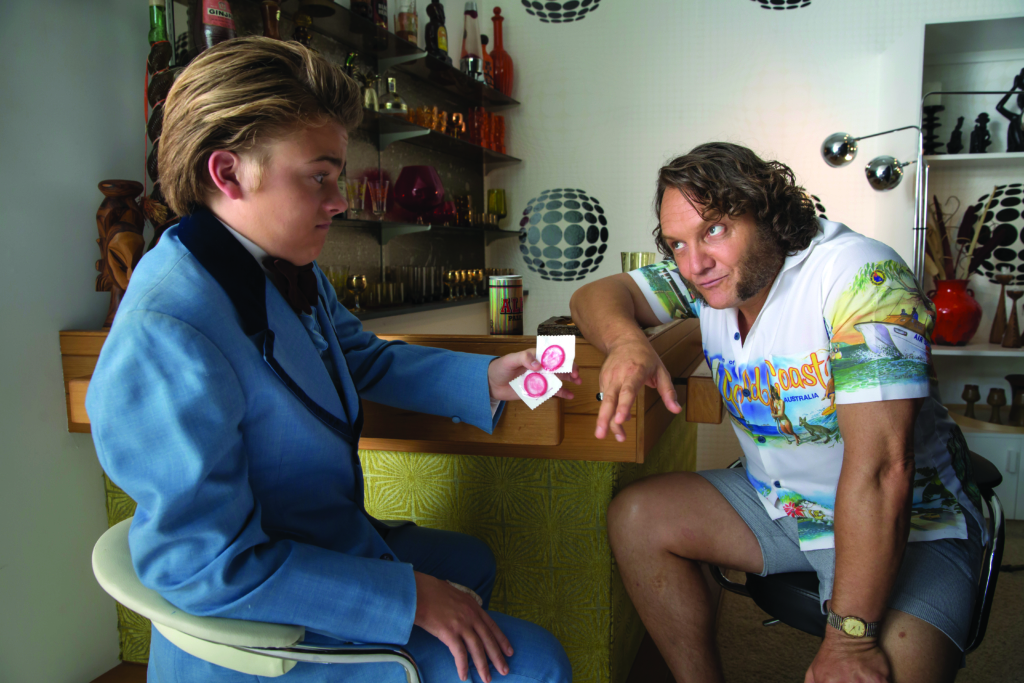
This all comes to a head in an explosive climax – literally. Thompson’s mayor, worried about the impact the malodorous sea mammal is having on tourism, recruits a demolition crew to load up the whale with a tonne or two of TNT. As you’d expect, things go pear-shaped; Swinging Safari concludes with a glorious slow-motion sequence of the town’s houses and landmarks splattered and split open by a biblical rain of whale bits. It’s probably the film’s funniest sequence – we can’t help but laugh when seeing Gale’s pristine, plastic-coated living room sprayed with rancid whale blood – while reinforcing the sense that this community is contaminated. Like a great dinner-party story, it’s a ‘ripper yarn’ with a barb in its tail.
Thematically, the termination of the whale’s storyline – until then aligned symbolically with Jeff and Melly – jars with the resolution of the young couple’s coming-of-age arc. While, as discussed, there’s no clear thesis thread to follow throughout the film, the culmination of both the parents’ aborted attempt at polyamory (which leads to frayed egos and childish pranks) and the whale’s beaching (which leads to gore and destruction) suggests a society whose foray into hedonism ends in disaster. For Jeff and Melly, though, their neighbourhood is a prison: an oppressive environment where escape is impossible. No wonder Melly asks her primary school teacher about the whale, ‘Why? Why would she kill herself?’
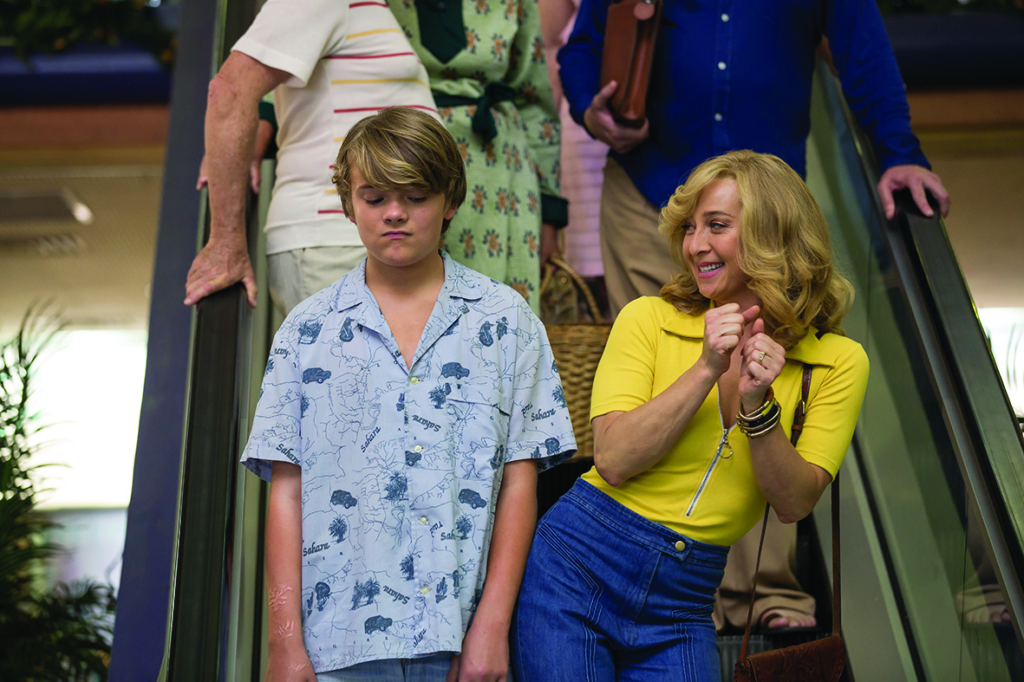
The pair concoct a thin scheme to run away to Melbourne (reinforcing the sense that this film is, in every respect, the anti-Neighbours), which is swiftly foiled when their otherwise-disengaged parents happen upon the two teens kissing and resolve to insert themselves into their children’s affairs.[5]This is incorporated into a broader sequence that shows the parents shifting from playing pranks to rewarding their children. If you squint, you can read this section as a commentary on Whitlam’s cultural subsidies of the era … but it’s a hell of a stretch. The possibility of a bus to Melbourne dissipates, replaced with a Blue Light Disco ‘date’ that soon degenerates into alcohol-fuelled chaos. The subsequent scene of Jeff and Melly being ushered into the former’s bedroom by expectant parents pushing prophylactics onto them attains the sharp satire the film has thus far avoided: what better way to portray the way parents indoctrinate their children into their oversexed culture than by showing them pressuring these kids into sex, like rival monarchs forging alliances through mixed bloodlines?
A better metaphor than the whale for Jeff and Melly’s plight is offered up halfway through the film. A digressive interlude about the history of the families’ pets presents a menagerie of underappreciated and often outright abused dogs, snakes and turtles. The sad story of Tommy the turtle – from the ‘exotic’ Galápagos – particularly resonates. The local kids take a power drill to his shell, and he’s left tied to the backyard Hills hoist lest he try to escape. When Melly releases Tommy into the ocean, he experiences the glimmering promise of freedom, but Elliott’s five-years-later coda shuts the door on any promise of hope. Holidaying in Fiji, Bec finds Tommy on the beach and returns him ‘to Wyong Place, where he lives tied to a Hills hoist to this day’. We can easily imagine a similar future awaiting our preteen protagonists, doomed to wade in the toxic sludge their parents have dragged them through. Swinging Safari’s satire may not be especially incisive, but it’s certainly sad.
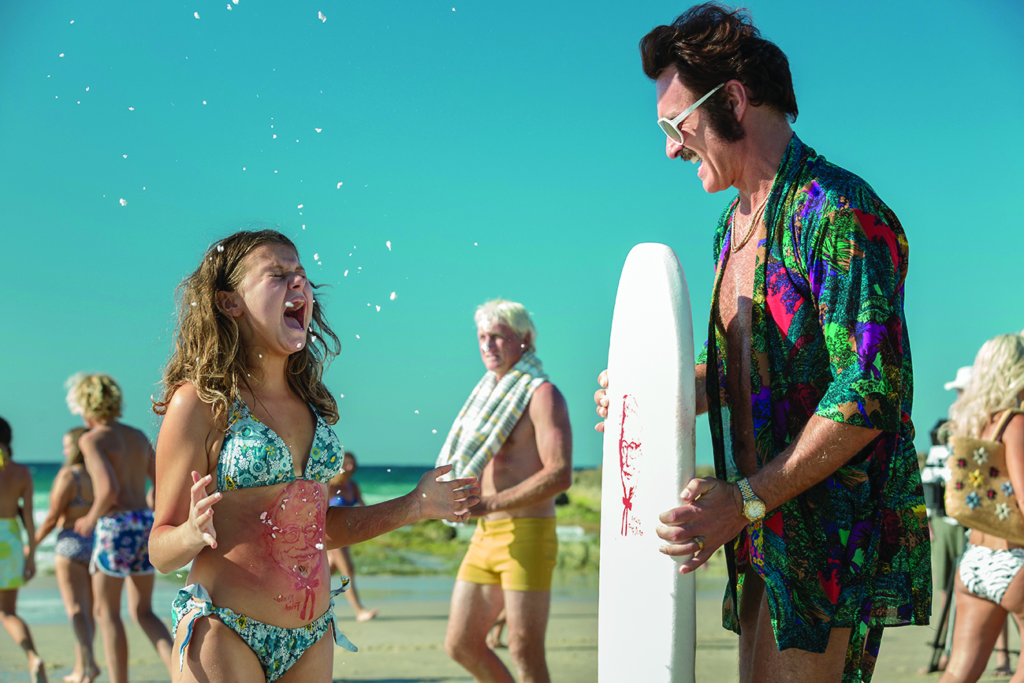
Returning to the question he posed at the beginning of the film, Jeff-as-narrator concludes with the following: ‘When people ask me what happened in the 1970s, I’ve got a simple answer: we did.’ It feels like a stretch. As a fast-paced, anti-nostalgic comedy, it’s hard to quibble with Swinging Safari. But, as a grand statement about the era, there’s not enough substance about why this is the ‘decade that defined us’ and, indeed, about who ‘we’ were … beyond an unpleasant lot with a fondness for beer and cask wine.
Endnotes
| 1 | In the episode ‘Remember When’ (Season 6, Episode 15). |
|---|---|
| 2 | Travis Johnson, ‘Swinging Safari’, FilmInk, 13 December 2017, <https://www.filmink.com.au/reviews/swinging-safari/>, accessed 2 February 2018. |
| 3 | It’s worth noting that Jeff, as narrator, lampshades the exaggerated aesthetic, pondering, ‘Am I rewriting history? Probably.’ From the opening frame, the film goes out of its way to underline that its campy style is anything but realistic. |
| 4 | A reference to Brian Trenchard-Smith’s eponymous 1976 film, then-unreleased in the diegetic world of Swinging Safari. |
| 5 | This is incorporated into a broader sequence that shows the parents shifting from playing pranks to rewarding their children. If you squint, you can read this section as a commentary on Whitlam’s cultural subsidies of the era … but it’s a hell of a stretch. |
